A nurse from North Carolina's Jaycee Burn Center at UNC Hospitals in Chapel Hill will make history when he takes over as the president of the American Nurses Association in January. He is the first man to ever hold the position.
"This is an extreme personal honor," said Ernest Grant who has a Ph.D. in nursing. "I feel very privileged, very blessed. I know that I stand on the shoulders of giants, people who have come before me."
Grant ran for the position and was elected, overwhelmingly, by his colleagues after serving as vice president of the organization, which represents the interests of more than 4 million nurses nationwide.
"It only seemed natural to take the next step and essentially break the glass ceiling," he said.
Grant will use his term to try to solve many issues he feels are hurting the nursing profession, including a potential nursing shortage.
"One of the things is getting them to see the nursing profession as a professional career," Grant said. "I think in the past people viewed nursing not necessarily as a profession."
He is also hoping to break stereotypes associated with being a male in nursing. He wants people to refer to him as a nurse, not as a "male nurse."
"I know that there will be a lot of eyes on me just to see how will the first male president of ANA, how successful will he be?" he said.
Grant is a recognized expert on burn care and is in charge of burn-care training for doctors, nurses and other health care professionals at the Jaycee Burn Center. He also teaches at the UNC-Chapel Hill School of Nursing.
In 2002, President George W. Bush gave Grant a Nurse of the Year Award for his work treating burn victims from the 2001 terrorist attack on the World Trade Center in New York.
He received his bachelor's degree from North Carolina Central University and his master's and doctorate from UNC-Greensboro.
BIOGRAPHY: Ernest J. Grant
Ernest Grant, RN, MSN first African American male president of the North Carolina Nurse Association - 2010-2011.
It's challenging and rewarding to make a difference in someone's life every day, even if it's a transition from this life to the next. I read once that 'nursing is the foundation of health care,' and it truly is. We are there 24 hours a day, seven days a week. We're the ones the family remembers. We're making a difference.Ernest Grant, RN, MSN, Nursing Leader and Fire Safety Expert
Ernest James Grant was born on October 6, 1958 in Swannanoa, NC, a small rural town in the Blue Ridge Mountains. When Ernest was a boy, segregation ruled in education, housing and employment. However, Grant recalls his childhood warmly.
It was a great town – like the fictional Mayberry – where you could leave your home unlocked and your keys in the car ….It also was a town that epitomized the saying, “It takes a village to raise a child,” My mother worked in the post office, and she knew everyone. I couldn’t get in trouble without her finding out. It was worse than being the preacher’s kid,

The youngest of seven children, Grant was 5 years old when his father died, leaving his mother as the sole parent. The Grant family and local community provided strong emotional and spiritual support, but had little money for his education. In high school, Grant became interested in a career in health care so his high school guidance counselor urged him to start out in an LPN program. Grant heeded her advice and in the fall of 1976, began his long and illustrious career in nursing as a student at the Asheville Buncombe Technical Community College’s (A-B Tech) Licensed Practical Nursing program. Grant may have been the first African American male to graduate from this program.
If it wasn’t for the community college system, I would not be where I am today. It was a leg up to continue my education. I went to one-year nursing program and decided that I really loved nursing.
Grant moved to Chapel Hill in the early 1980s and began work at the JayCee Burn Center at North Carolina Memorial Hospital. He found his life’s calling.
Even in his first months as a burn nurse, he was struck by the need for prevention. He remembers one toddler in particular who was about the same age as his nephew. The child had been underfoot in the kitchen as his mother prepared dinner — chicken fried in a pot of hot oil. When she turned away for a moment, the child pulled the pot of hot grease down on top of himself, sustaining deep, life-threatening burns. Most burn nurses will tell you that for almost every burn injury, they can clearly see the possibility of prevention. Grant became a man with a mission. http://www2.nursingspectrum.com/articles/article.cfm?aid=6517
Knowing he wanted to provide more services than his LPN credential would allow, Grant returned to school earning a Bachelor of Science in Nursing degree from North Carolina Central University in 1985 and a Master’s of Science in Nursing degree from UNC-Greensboro in 1993.
While provide excellent clinical care for burn victims, Grant knew more could be done to prevent burn injuries and deaths. He became a statewide, and later national and international leader in burn prevention education and policy advocacy. An article in the Nurseweek Magazine (2002) http://www2.nursingspectrum.com/articles/print.html?AID=6517 ) listed Grant’s achievements in fire safety in North Carolina up to that time:
Grant lobbied the state legislature, citing data from a five-year study, for the revision of a law passed in 1993 that allowed the sale of fireworks to all people of all ages. The law now restricts sale to those age 16 and older, and Grant continues to work on tighter restrictions.
Grant successfully lobbied the North Carolina Legislature to pass a bill mandating that hot water heaters be preset to 120 F and labeled with information about preventing scalds.
He piloted and widely disseminated the LNTB program throughout North Carolina and other areas of the Southeast.
Grant helped design and implemented the “Remember-ing When” program for seniors, a fall and fire prevention initiative that uses games and group work to teach safety to senior citizens.
He developed a long-term National Burn Awareness Campaign that focuses on different burn prevention topics each year, such as prevention of camping and recreational burns, gasoline injuries, and scald injuries.
Grant led the effort to pass the Fire-Safe Cigarette Act in 2007, which requires that only “fire-safe” cigarettes be sold in North Carolina. Grant, at 6 feet, five inches, is best known to young school children in North Carolina when he dresses up as Sparky the Fire Dog and gives fire safety lesson in their classroom.
For over twenty years, Grant has coordinated the nationally acclaimed burn prevention outreach programs at the JayCee Burn Center in Chapel Hill. Each year he personally educates several thousand citizens. Grant is on the road most of the week, bringing awareness to burn prevention through fire safety seminars, health fairs, visits to civic organizations and coalitions with fire safety professionals at the state, national and international levels. He is invited to give upwards of 150 presentations this year. As full as his schedule is today Grant still maintains his skill as an expert clinician and arranges and supervises learning experiences for student nurses, first responders, and paramedics from across the state. In addition to his clinical, educational and public policy work in burn prevention in North Carolina, Grant regularly teaches burn management to the military at Ft. Sam Huston, TX. Following Sept. 11, 2001, he volunteered in the burn center at The Burn Center, New York Weill Cornell Medical Center-New York Presbyterian Hospital and cared for patients injured during the attacks on the World Trade Center. For 10 days straight, he worked 12-hour night shifts. For over a decade Grant has served as a consultant to the government in South Africa preparing fire safety curricula for children, adults and senior citizens and advising the Congress on burn prevention law and policies.
Grant’s passion for fire safety is rivaled by his passion for professional nursing. He has been active in a variety of professional nursing organizations at the local, state, and national level. Grant has served on almost every committee and held almost every office in the North Carolina Nurses Association including becoming the first African American male President in 2010. His leadership involvement at the national level includes his tenure on the American Nurses Association Board of Directors, 2004 – 2008 and the Board of Directors of the American Nurses Credentialing Center from 2004 -2007. He has been an active member of the American Association of Men in Nursing, serving as a role model for young men of color entering the profession. In 2011 he was inducted into the prestigious Fellowship of the American Academy in Nursing.
Grant is a sought after speaker, and has written several articles for professional journals. In addition to his nursing activities, Grant is also busy in fire safety organizations. In 2012 he served as the First Vice Chair of the National Fire Protection Association Board of Directors. He is also involved in several church ministries and sings in an award-winning gospel choir.
Grant has earned numerous awards during his career including:
2001 - Nurse of the Year Award from President George W. Bush for his work treating burn victims at the Cornell Burn Center near the World Trade Center site.
2002 - American Nurses Association (ANA) Honorary Nursing Practice Award
2002- Nursing Spectrum’s Nurse of the Year
2003 – UNC-Greensboro Alumnus of the Year Award
2011- Inducted into the Fellowship of the American Academy of Nursing
Grant has many aspirations for the future. He is enrolled in a doctoral program in nursing at UNC-Greensboro and is considering both more involvement in politics and seeking the Presidency of the American Nurse Association. Wherever the future takes him, his priorities will remain the health and well being of all people. When asked to describe himself for a recent magazine article, he modestly replied “I consider myself a preventionist”.
Source: http://www.aacc.nche.edu/About/Awards/oaa/Pages/egrant.aspx
ABUJA: Training Schedule for Basic Life Support BLS, Pediatric Advanced Life Support (PALS), Advanced Cardiovascular Life Support ACLS, First Aid, CPR, AED
PORTHARCOURT: Training Schedule for Basic Life Support BLS, Pediatric Advanced Life Support (PALS), Advanced Cardiovascular Life Support ACLS, First Aid, CPR, AED
LAGOS: Training Schedule for Basic Life Support BLS, Pediatric Advanced Life Support (PALS), Advanced Cardiovascular Life Support ACLS, First Aid, CPR, AED





